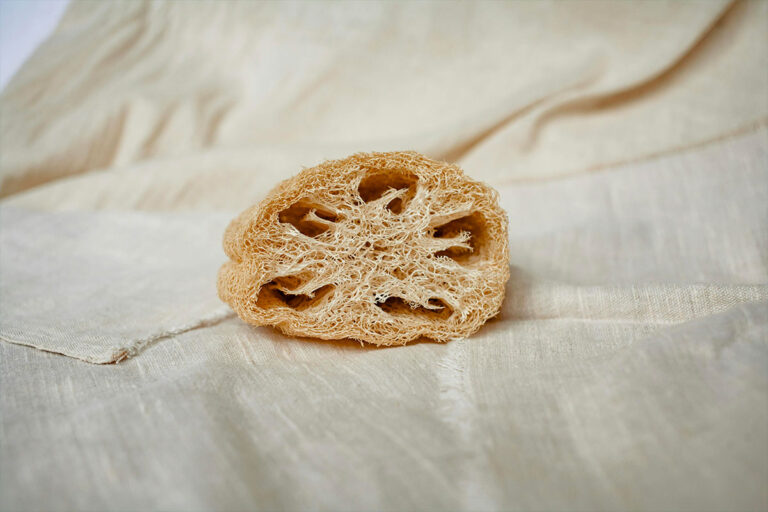In recent years, growing environmental awareness has driven many people to seek ecological alternatives to everyday products. One of the most interesting discoveries in this field is loofah, an eco-friendly and versatile vegetable sponge that is gaining increasing popularity. In this article, we will explore what loofah is, how it is cultivated and harvested, its ecological characteristics, its multiple uses, health benefits, and where to buy it.
What is a loofah sponge?
The loofah is a plant belonging to the Cucurbitaceae family, the same as zucchinis and cucumbers. Originating from tropical and subtropical regions, the loofah is mainly cultivated in Asia and Africa.
The fruit of the loofah, when mature, is dried to obtain the vegetable sponge that we all know. The inner fibers of the fruit transform into a fibrous network that, once dried, becomes a natural sponge ideal for multiple uses.
Uses of the Loofah Sponge
The loofah is extremely versatile and can be used in many ways in everyday life. Here are some of its main uses:
- Body cleaning sponge: The loofah is particularly appreciated as a shower sponge. Its soft and flexible fibers gently exfoliate the skin, removing dead cells and leaving the skin soft and radiant. An excellent example is the Loofah Cylinder by Martini SPA, a sponge made from 100% Egyptian loofah that provides softness, silkiness, and radiance to the skin.
- Dishwashing: The loofah can be used in the kitchen to wash dishes, pots, and pans. Its natural fibers are effective at removing food residues without scratching delicate surfaces.
- General cleaning: Besides the kitchen, the loofah is useful for cleaning other surfaces in the house, such as sinks, countertops, and even for cleaning plants, helping to remove dust and dirt from the leaves.
The ECO loofah cylinder by Martini SPA
The ECO Loofah Cylinder by Martini SPA is made from pure Egyptian loofah, a variety renowned for its absorbency, exfoliating power, flexibility, and durability. Compared to Asian loofah, Egyptian loofah offers superior performance, being gentler on the skin. Ideal for preparing the skin for a more intense and lasting tan, this sponge is dermatologically tested and latex-free.
The product is 100% vegetable, derived from the drying of a plant in the Cucurbitaceae family. It is packaged in a 100% biodegradable and compostable PLA bag, with a 100% recycled and recyclable cardboard. Additionally, it is made in Italy using renewable energy and adhering to the highest certified quality standards.
The sponge is ideal for anti-cellulite massage and should be thoroughly wetted before use. It complies with REACH regulations, is not tested on animals, and does not deplete marine environments.
Where to Buy Loofah Sponges
You can purchase Martini SPA loofah sponges online from numerous retailers:
Ecological characteristics of Loofah
One of the main advantages of loofah is its sustainability. Being a completely natural sponge, it is biodegradable and does not contribute to plastic pollution. Unlike synthetic sponges, the loofah does not release microplastics into the environment during use or disposal. Additionally, loofah cultivation has a reduced environmental impact as it does not require the use of chemical pesticides and can be grown in rotation with other crops to improve soil health.
Health and wellness benefits
In addition to environmental benefits, the loofah also offers numerous health and wellness advantages. Used as a shower sponge, the loofah naturally exfoliates the skin, improving blood circulation and stimulating cell renewal. Its hypoallergenic properties make it suitable for sensitive skin, avoiding irritations and allergic reactions common with synthetic sponges.
Cultivation and harvesting process
Cultivating loofah requires a warm and humid climate. The plant grows on trellises or supports to allow the fruits to develop without deforming. After about 150 days from sowing, the fruits are ready to be harvested. Once harvested, the fruits are left to dry in the sun. When they are completely dry, the outer peel is removed, and the inner fibers are cleaned and cut into the desired shapes.
How long does a loofah sponge last? How to take care of it
The duration of a loofah sponge varies based on the frequency and manner in which it is used and maintained. Generally, a loofah sponge can last from one to three months with regular use. To prolong its life, it is important to follow some simple guidelines:
- Rinse well after each use: ensure all soap residues and dead skin cells are removed.
- Air dry: avoid leaving the sponge in humid environments. Hanging it in a well-ventilated place helps prevent mold and bacteria growth.
- Regularly sanitize: soak the sponge in boiling water for a few minutes each week to keep it clean and sanitized.
- Replace when necessary: when the sponge starts to fray, lose its texture, or develop an unpleasant odor, it is time to replace it.
By following these practices, you can ensure a longer useful life for your loofah sponge, maintaining its hygiene and effectiveness.
Conclusion
The loofah represents an eco-friendly and versatile alternative to synthetic sponges, offering numerous benefits for both the environment and health. If you want to contribute to a more sustainable future, try incorporating loofah into your daily routine and discover all its advantages.
